- Home
- M. K. Hume
King Arthur: Dragon's Child: Book One (King Arthur Trilogy 1)
King Arthur: Dragon's Child: Book One (King Arthur Trilogy 1) Read online
King Arthur: Dragon's Child
M. K. HUME
headline
www.headline.co.uk
Copyright © 2009 M. K. Hume
The right of M. K. Hume to be identified as the Author of
the Work has been asserted by her in accordance with the
Copyright, Designs and Patents Act 1988.
Apart from any use permitted under UK copyright law, this publication may
only be reproduced, stored, or transmitted, in any form, or by any means,
with prior permission in writing of the publishers or, in the case of
reprographic production, in accordance with the terms of licences
issued by the Copyright Licensing Agency.
First published as an Ebook by Headline Publishing Group in 2009
All characters - other than the obvious historical figures - in this publication
are fictitious and any resemblance to real persons, living or dead,
is purely coincidental.
Cataloguing in Publication Data is available from the British Library
eISBN : 978 0 7553 4966 1
This Ebook produced by Jouve Digitalisation des Informations
HEADLINE PUBLISHING GROUP
An Hachette UK Company
338 Euston Road
London NW1 3BH
www.headline.co.uk
www.hachette.co.uk
Table of Contents
Title Page
Copyright Page
Dedication
Acknowledgements
CHAPTER I - THE EDGES OF MEMORY
CHAPTER II - THE BLADE AND FIRE
CHAPTER III - CHILDHOOD’S END
CHAPTER IV - GALLIA
CHAPTER V - BIRTH AND DEATH
CHAPTER VI - CLEANSING THE ALTAR
CHAPTER VII - THE AFTERMATH
CHAPTER VIII - A CONVENIENT MARRIAGE
CHAPTER IX - THE IDYLL
CHAPTER X - AT VENTA BELGARUM
CHAPTER XI - TRIAL OF STRENGTH
CHAPTER XII - TO DIE IN ANDERIDA
CHAPTER XIII - CARRION CRY
CHAPTER XIV - OUT OF THE MARSH FIRES
CHAPTER XV - ENDINGS AND BEGINNINGS
CHAPTER XVI - THE UNBORN CHILD
CHAPTER XVII - BLOOD PRICE
CHAPTER XVIII - A CHILD’S RECKONING
CHAPTER XIX - UTHER’S LEGACY
CHAPTER XX - GLASTONBURY
CHAPTER XXI - THE KEYS TO THE KINGDOM
CHAPTER XXII - A SAXON SUMMER
AUTHOR’S NOTE
This work is dedicated to my friend, Julienne Marie Gleeson, who left this life on 5th February, 2004.
She was my beloved friend, my second self, and my unsung hero. Julie gave me backbone when life seemed darkest, and she taught me that there is great beauty in the struggle to fulfill a dream. She had resolutely survived death, fierce adversity, animosity and violence, until cancer finished her life struggle before her fiftieth birthday.
The fairest flowers are ‘born to blush unseen and waste their sweetness on the desert air’, but I recognized Julie’s rareness and cherished every memory of our time together.
This book belongs to her because she fought to persuade me to write it. Without her, it may never have been born.
Ave, Julie, where you rest after life’s suffering. I hope you approve of my offering.
ACKNOWLEDGEMENTS
I appreciate the simple fact that many readers avoid this section of any book. In this case, however, I hope you make an exception!
King Arthur: Dragon’s Child, as the first volume in The Chronicles of Arthur: King of the Britons, would never have seen the light of day had my husband, Arthur Michael, not given it his inimitable editing and criticism, even when battling a serious illness. There are no words to thank him for his support, even though his oft-repeated words, ‘What does this crap mean?’ will always make me smile.
To Margot Maurice, and those members of the Independent Publishers of Australia Network who assisted me to achieve my goals - my thanks for your professionalism and excellent advice when it was most needed.
I am indebted to all the great writers of Arthurian Literature, from Gildas to Charles Williams and beyond, who made King Arthur, the High King of Britain and Dux Bellorum, such a fascinating hero in my imaginative other-life. Even when I cursed the dead languages I needed to learn to know him better, I became obsessed with the glories of his epic as I struggled with post-graduate research. Without those histories and literary masterpieces written during the past thousand years to fall back on, I could not have hoped to write my own version of Arthur’s life and times.
Without the support of my friends, Penny Cranitch, Lyn Baker, Robyn Jones and Pauline Reckentin, and many others, I would have crumbled long ago under the weight of this project. To my friends - I thank you for your love and support, despite my many faults. To those who would have done me harm - I thank you also, for you have taught me the valuable lesson that life is neither fair nor just, and that only by opposition to that which is immoral and wrong do we grow as people. I know you did not intend to spur me on to achievement, but the end result is ultimately the same.
My thanks must also go to the innumerable students at various High Schools over the years that enjoyed my stories and shuddered at the more gruesome of my plots and ideas. They always liked my more eccentric and grim visions, and they collectively set me on a path that avoided the pitfalls of writing stories that were simply ‘nice’ and ‘acceptable’.
Finally, thanks to my high school English Teacher, Mrs Lapa, who tore my facile essays and short stories to shreds and taught me to write for me, and for me alone, and to give a whole-hearted effort in every task I attempted. She only taught me for one year, and she never graced students again with her unique viewpoints. She was a great loss to Education Queensland, especially in the public education system where the standards in teaching expertise are often narrow and inadequate - at best! But this excellent teacher of English taught me how to swim upstream, and to understand that populist visions usually involve a compromise. I hope that Mrs Lapa, wherever she is, is happy and at peace, although she will probably never know just how much I admired this lady for her professionalism!
Of course, how do I thank my agent, Dorie Simmonds, or my publisher, Jane Morpeth, and the whole crew at Headline? They have given substance to a dream.
King Arthur of the Britons was the second great love of my life, and he has driven me hard for over thirty years. My interpretations of how he lived and loved are just that - mine alone - viewed through the kaleidoscope of time. They are coloured by the demands of our current age, one that has little time for duty and less inclination towards nobility.
CHAPTER I
THE EDGES OF MEMORY
‘For a certain order embraces all things, and anything which departs from the order planned and assigned to it, only falls back into order, albeit a different order so as not to allow anything to chance in the realms of Providence.’
Boethius
The forest embraced the boy like an ancient cloak, ragged at the hems, but still serviceable and strong in the weave. The roots of the oak trees twisted out of the deep, mouldering earth, and their branches were so thick and tangled that the boy felt as if he had plunged into cool, green water after the humid brilliance of the fallow fields. The threat that this adventure would lead to stern punishment meant little to him, for he would be punished anyway. If not for these hours of sensual pleasure, then some half-forgotten sin would stir his foster-father to wrath.
In a dense canopy of alder and oak,
the trees starved all grass of the necessities of life. The boy walked through a perilous coverlet of leaf drifts, fallen branches embroidered with the verdigris of moss and strange, fleshy flowers that covered hidden badger setts. The eerie beauty of this half-lit world fascinated the boy and set his heart racing with the promise of danger. Anything could dwell in these sudden hollows of almost midnight blue. Within the shadows, anyone could be close enough to touch him in this half-imagined landscape where his foster-father’s power was reduced to less than dust. He himself could be anyone, and he could dream whatever he chose without hindrance. Here, he was neither safe nor unsafe, but most truly himself.
The boy found a favoured natural glade, some ten spear shafts across, where tree trunks mimicked pillars and a slender blade of light reached to the forest floor. A great rock, covered in white lacy lichen, squatted off centre in the glade, and the boy ran his narrow hands over its surface until he felt the worn whorls and lines roughly hacked into its flank. For some half-instinctive reason, he chose to seat himself as far from those barely visible patterns as he could while he stared hard at a hollow, barely the length of his hand, which had been chipped out of the rock at its centre. It was tilted strangely, for the boy had once sacrificed a little liquid from his goatskin water carrier to fill that shallow, manmade cup. He had watched transfixed as some of the water drained away, following the spirals and whorls until the rivulet fell on to the forest floor.
Something dark always flexed its wings in the boy’s mind when he touched that hollow. He could imagine a sticky, viscous thread of blood snaking away from his fingers into the pattern, and filling his nostrils with the unsettling scent of iron.
‘Things have died here,’ he whispered to break the sepulchral silence of the glade. ‘But they are so old . . . perhaps as ancient as the trees themselves.’
He loved to frighten himself with his imaginings, even though he was a sturdy boy who was taller than his birth age of twelve years. Already the shape of manhood was coming upon him, and he drove the Saxon serving woman, old Frith, half crazy as he outgrew his leather trousers and strained the stitches of his tunics at the shoulders.
‘A great lump of a boy,’ his foster-father explained to the occasional visitor. ‘Half wild as well . . . a little wanting, if you take my meaning.’
The master, Lord Ector, was himself tall and broad in shoulder and girth, but Lump, as the kitchen slaves called the boy derisively, threatened to tower well over six feet in height.
‘A little barbarian,’ his foster-brother would drawl to his friends, from his advanced age of seventeen and the impregnable reality of full manhood. ‘He scarcely uses the baths - and his hair! Once his beard grows, he’ll be a walking mop!’
The young men laughed, for Caius aped the airs of an aristocratic dilettante, although the Dracos Legion, the last to protect Britain, had been gone for many years. Roman by birth, as he described himself with pride, Caius had no time for Lump, who appeared to have none of the true blood in his veins. Caius conveniently ignored his own Celtic paternity.
‘Why my pater accepted him defies imagination.’
Caius smoothed his shining black hair which he kept militarily short and carefully curled over his forehead.
‘When he was an infant, he cried constantly until the women put him in a linen chest. Then, when he grew older . . . well, look at that vacuous face. He’s learned his letters, it’s true, for Mater would not tolerate an ignorant son, foster or no, but he never reads the scrolls or conducts himself as a well-born youth should. Targo beats him regularly, for all the effect it has on him, for Lump just stands and takes the blows with that vague expression on his fat face.’
Caius and his Celt father, Ector, were wrong.
The boy read the scrolls in the meagre scriptorium, but only when the rest of the house was asleep and he could steal a little oil for his lamp. The flickering light made the Latin words dance with a life quite apart from the ancient memories they shared with him. But he had eaten the stale crusts of charity for every day of his twelve years, and they made an unpalatable and indigestible meal, scrolls or no scrolls.
So Lump simply went away whenever he chose - either to the woods or to the deepest caverns in his head.
The boy stretched his long, smooth legs on the rock’s spine. What hair his body grew was certainly very pale, so his limbs were burned to a rich bronze by hours in the sunlight. His face was neither fat nor featureless, but was broad and already sharply angular at the cheekbones. His hair curled so wildly that no amount of combing could completely tame the spiralled ringlets that formed a red-gold nimbus around his head. His eyes were unusual in a world of largely brown, hazel, green and black-eyed people, slaves and masters both, for they were so pale and grey that they seemed almost blind in his smooth face.
Those eyes trapped the light, but nothing of the soul behind them escaped as a warning to those who would torment him.
With regret, the boy left the glade as the blades of light narrowed, then slid behind the dense foliage that towered above him. The air had a sultry heaviness, as if a storm was coming. He would have welcomed the steady driving rain from a downpour, but his empty stomach was warning him that he must return to the villa - or else go hungry for yet another night.
‘Farewell, rock,’ he whispered to the body-warmed stone. ‘Farewell, trees.’
Arriving in the forest was always more pleasant than returning to the villa. As the boy pushed his way through the waist-high grasses of the western field, avoiding the stinging nettles that grew in dense patches, he put on his ‘family face’ as he called it, and assumed his accustomed untidy shamble.
When he reached the outbuildings of the Villa Poppinidii, his back was bowed and his feet scuffed the crazy stone pathways between the stables and the piggery.
‘You’re wanted, Lump,’ a pert housemaid giggled at him as she emptied slops into the swine trough. ‘You’ve been wanted for hours. The master has visitors.’
‘Ugh!’ was the boy’s only reply.
Now he would have to bathe. He’d need to find a clean tunic as well, if Frith had found the time to mend his second-best clothing.
He eyed his filthy toes in their ragged sandals with ill humour. He’d be late - and Ector would not tolerate a tardy foster-son.
I’d best be moving then, the boy admonished himself with little enthusiasm. He sought out Frith in the kitchens where she was most usually seated, warming her old bones.
‘It’s a good thing I am fond of you, young rapscallion,’ the old woman mumbled through her broken teeth. ‘I’ve mended your tunic and found you a leather belt to fit that waist of yours. And don’t forget the perfumed oil,’ she called out after him. ‘Perhaps it will train that hair of yours - it’s full of twigs.’
‘I thank you, good Frith,’ he called back over his shoulder. ‘Sleep well by your fire.’
‘That Lump will never amount to much,’ the sour-faced cook snapped as he fiddled with a brimming pot filled with boiled eels and root vegetables.
‘Ah, but it’s amazing how balanced his temper is when he is treated with kindness,’ Frith replied tartly. ‘It’s also remarkable how agile the boy becomes when he thinks no one is looking.’ She had been nurse to the last Roman child born to the House of Poppinidii, the sweet and tiny Livinia, and she knew all the secrets of the villa.
‘Go back to sleep, Grandmother. You’ve been out in the sun too long,’ was the cook’s acerbic reply.
Pausing only in his narrow, airless cubicle to gather up his clothing, his old strigil and a small bottle of rather rancid oil, the boy ran to the very end of the east wing of Villa Poppinidii, taking care to skirt the atrium, the eating couches and the scriptorium in his haste. In truth, the boy loved to hear stories of the world beyond the villa, which only visitors brought. For him, a little scrubbing was a small price to pay for a night in the corner, listening to the men talk of strange and alien places.
Hastily, in the mosaic pool of the calidarium,
the boy stripped and heated his skin in the hot water. He had scant regard for the proper civilities and order of the bathing rites, but concentrated on opening the pores of his skin, rubbing in the sickly oil while he tried not to breathe the stench in through his nose. The boy then dragged the old strigil over several days of accumulated dirt. He even paid cursory attention to his nails so that, eventually, the worst of the day’s excesses were removed.
Then, after a quick splash in the frigidarium to cleanse and close his pores, he gave himself a rough towelling and attempted to tie back his wet, wild hair with a leather thong. Finally, he donned a tunic, belt, loincloth and sandals, and ran through the silent colonnades to the room where all visitors were entertained.
‘There you are, boy,’ Ector snapped. ‘At least we must be grateful that you are clean.’ He smiled at his guests to soften the effect of his harsh words. ‘And now you can assist with the serving,’ he ordered. ‘As is your duty.’
Ector was a big man, thick in the body and broad of shoulder, but his legs were unnaturally short and bandy. His face was florid and almost smooth of wrinkles, for the master of the house rarely fell prey to extremes of emotion. His mouth was good-humoured and his pale, blue eyes were slightly protuberant, giving his face an expression of perpetual surprise.
But only a fool underestimated Master Ector, a man raised in the warrior tradition, to which the hard muscle of his body bore witness. Having served his time in the fortresses of the north, Ector now enjoyed his broad acres, his fat cattle and kine and the peace of a quiet middle age. However, should external peril threaten his house, like an old battle hound Ector would rise to fight with merciless glee.

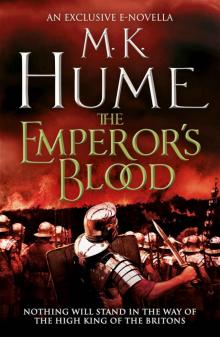 The Emperor's Blood (e-novella)
The Emperor's Blood (e-novella)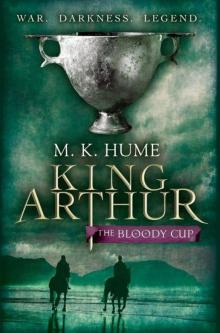 King Arthur: The Bloody Cup: Book Three
King Arthur: The Bloody Cup: Book Three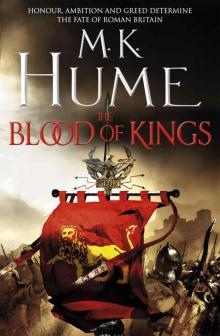 The Blood of Kings: Tintagel Book I
The Blood of Kings: Tintagel Book I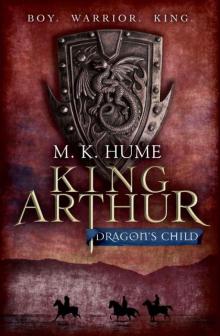 King Arthur: Dragon's Child: Book One (King Arthur Trilogy 1)
King Arthur: Dragon's Child: Book One (King Arthur Trilogy 1)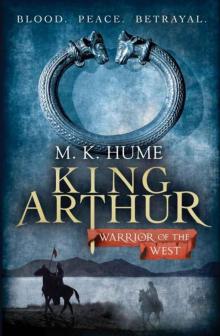 King Arthur: Warrior of the West: Book Two
King Arthur: Warrior of the West: Book Two The Storm Lord
The Storm Lord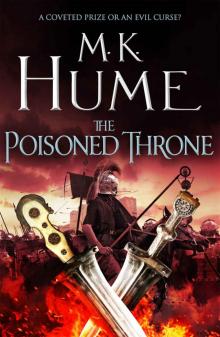 The Poisoned Throne: Tintagel Book II
The Poisoned Throne: Tintagel Book II![M. K. Hume [King Arthur Trilogy 04] The Last Dragon Read online](http://i1.bookreadfree.com/i2/04/07/m_k_hume_king_arthur_trilogy_04_the_last_dragon_preview.jpg) M. K. Hume [King Arthur Trilogy 04] The Last Dragon
M. K. Hume [King Arthur Trilogy 04] The Last Dragon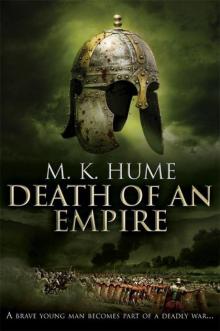 Prophecy: Death of an Empire: Book Two (Prophecy Trilogy)
Prophecy: Death of an Empire: Book Two (Prophecy Trilogy)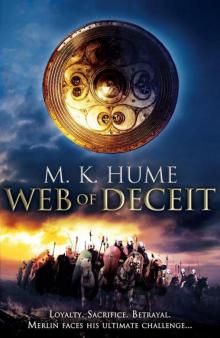 Prophecy: Web of Deceit (Prophecy 3)
Prophecy: Web of Deceit (Prophecy 3)